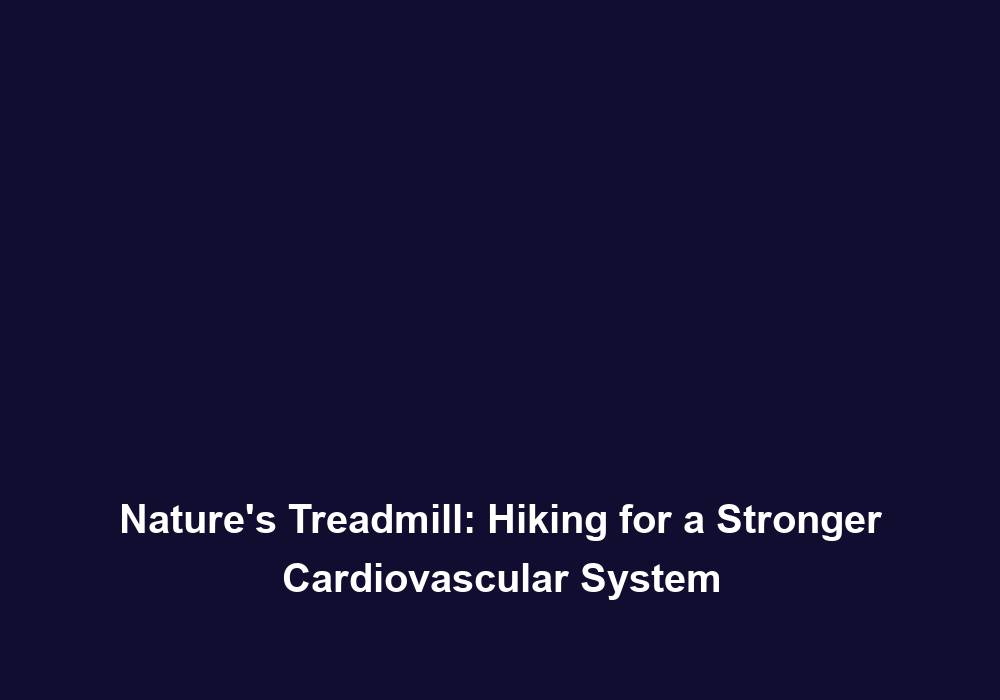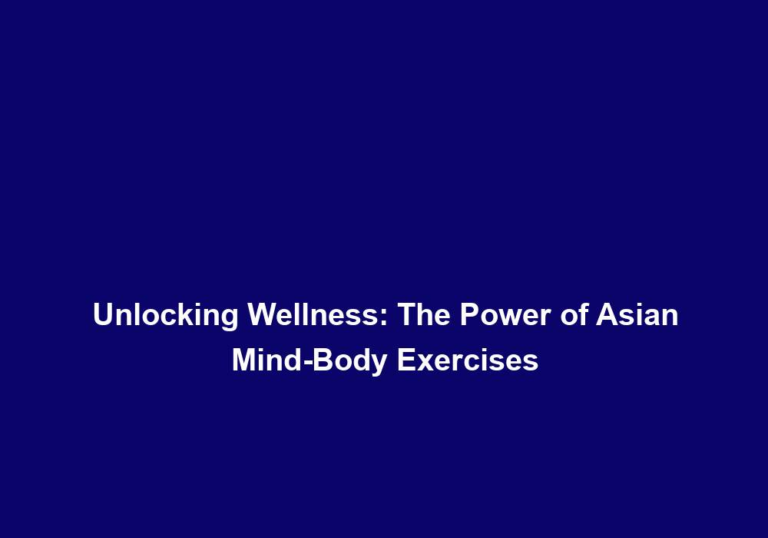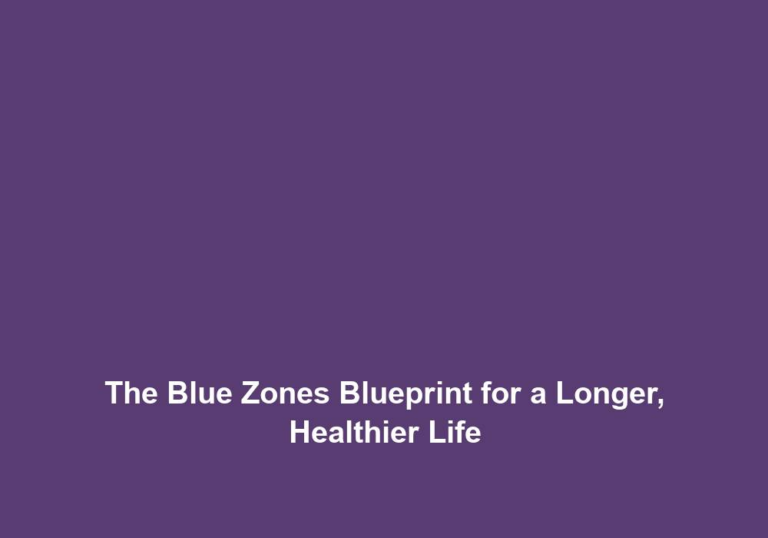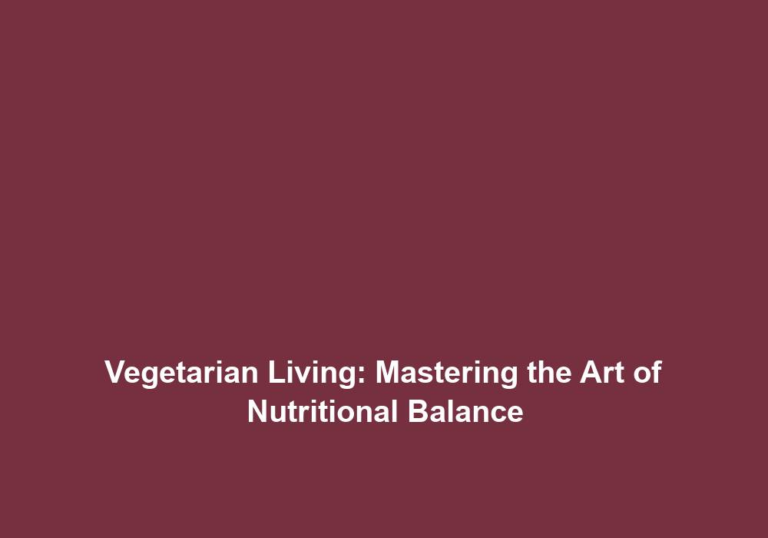Nature’s Treadmill: Hiking for a Stronger Cardiovascular System
Hiking is not only a pleasurable outdoor activity, but it also offers numerous health benefits, especially for your cardiovascular system. When you embark on a hiking adventure, you not only get to explore breathtaking landscapes, but you also engage in a full-body workout that helps strengthen your heart and boost your overall cardiovascular health. In this article, we will delve into the many ways hiking can contribute to a stronger cardiovascular system.
The Cardiovascular System and Its Importance
Before we dive into the benefits of hiking, let’s briefly understand the cardiovascular system and its crucial role in maintaining our overall health. The cardiovascular system consists of the heart, blood vessels, and blood, working together to circulate oxygen, nutrients, and hormones throughout the body. This system plays a vital role in maintaining the body’s core temperature, transporting waste products, and supporting the immune system.
A strong cardiovascular system is essential for overall well-being, as it ensures that all organs and tissues receive an adequate supply of oxygen and nutrients. Regular exercise, such as hiking, helps to improve the efficiency of this system, reducing the risk of various cardiovascular diseases and promoting a healthier lifestyle.
Hiking as a Cardiovascular Workout
Hiking is an excellent way to engage in moderate to vigorous aerobic exercise. Whether you’re traversing mountains, exploring national parks, or wandering through forests, hiking offers a dynamic and challenging workout for your cardiovascular system. Let’s take a closer look at how hiking contributes to a stronger heart and improved cardiovascular health:
1. Increased Heart Rate
During hiking, your heart rate increases as your body works harder to supply oxygen-rich blood to your muscles. This increased heart rate helps strengthen your heart muscle, enabling it to pump blood more efficiently throughout your body. Over time, regular hikes can lead to a lower resting heart rate, indicating an improved cardiovascular fitness level.
2. Improved Blood Circulation
Hiking involves constant movement, which stimulates blood flow and enhances circulation. As you hike, your blood vessels dilate to accommodate the increased blood flow, ensuring that oxygen and nutrients reach your organs and tissues more effectively. Enhanced blood circulation reduces the risk of cardiovascular diseases, such as hypertension and atherosclerosis.
3. Lower Blood Pressure
Regular hiking has been shown to help lower blood pressure levels. The physical exertion involved in hiking helps to regulate blood pressure, reducing the strain on your arteries and decreasing the risk of hypertension. By engaging in this outdoor activity, you can naturally maintain healthy blood pressure levels and support your cardiovascular health.
4. Weight Management
Maintaining a healthy weight is crucial for cardiovascular health. Hiking, being a calorie-burning activity, aids in weight management and weight loss. As you traverse various terrains and inclines, your body burns calories, helping to shed excess pounds and reduce the risk of obesity-related ailments, such as heart disease and diabetes. Additionally, hiking helps to build lean muscle mass, which further contributes to a healthy weight and improved cardiovascular function.
5. Strengthened Heart and Lung Function
Hiking involves climbing hills, navigating uneven trails, and overcoming obstacles, all of which significantly challenge your cardiovascular system. As you tackle these physical demands, your heart and lung capacity increase, resulting in improved overall cardiovascular function. Regular hiking can enhance your endurance, making everyday activities easier and reducing the likelihood of experiencing shortness of breath.
6. Reduced Stress and Improved Mental Health
Engaging in outdoor activities like hiking also offers mental health benefits, which indirectly contribute to cardiovascular health. Being surrounded by nature, breathing fresh air, and being away from the hustle and bustle of daily life can significantly reduce stress levels. Lower stress levels have been linked to a decreased risk of heart disease, improved heart health, and overall cardiovascular well-being. Additionally, hiking provides an opportunity for mindfulness and can improve mood and mental clarity.
How to Make the Most of Your Hiking Experience
To maximize the cardiovascular benefits of hiking, here are a few tips to keep in mind:
-
Start slow and gradually increase intensity: If you’re new to hiking, start with shorter, less challenging trails, and gradually work your way up to more strenuous hikes. This approach allows your body to adapt to the physical demands while minimizing the risk of injuries. It’s important to listen to your body and not push yourself too hard too soon.
-
Invest in appropriate footwear and gear: Wearing comfortable and supportive hiking shoes will provide stability and reduce the risk of strains or sprains. Additionally, consider using hiking poles to distribute weight and lessen the impact on your joints. Proper gear will enhance your hiking experience and minimize the risk of injuries.
-
Stay hydrated and fuel your body: Carry an adequate amount of water and snacks to stay hydrated and maintain energy levels during your hike. Proper hydration and nutrition are essential for optimal cardiovascular function. Remember to pack lightweight, nutritious snacks that provide sustained energy.
-
Listen to your body: Pay attention to any signs of fatigue or discomfort during your hike. Take breaks when needed and know your limits to prevent overexertion or injury. It’s important to pace yourself and allow your body time to rest and recover.
-
Choose diverse trails: Explore different terrains and elevations to challenge your cardiovascular system and engage various muscle groups. This variety will help you enhance your overall cardiovascular fitness and prevent plateauing. Consider incorporating uphill climbs, downhill descents, and uneven surfaces to make your hikes more challenging and enjoyable.
Conclusion
Hiking is a fantastic way to enjoy nature while reaping the benefits of a stronger cardiovascular system. Regular hikes can improve heart health, increase lung capacity, regulate blood pressure, aid in weight management, and reduce stress levels. By incorporating hiking into your routine, you can promote a healthier lifestyle and enhance your overall well-being. So put on your hiking boots, grab a backpack, and embark on an adventure that not only feeds your soul but also strengthens your cardiovascular system. Happy hiking!







